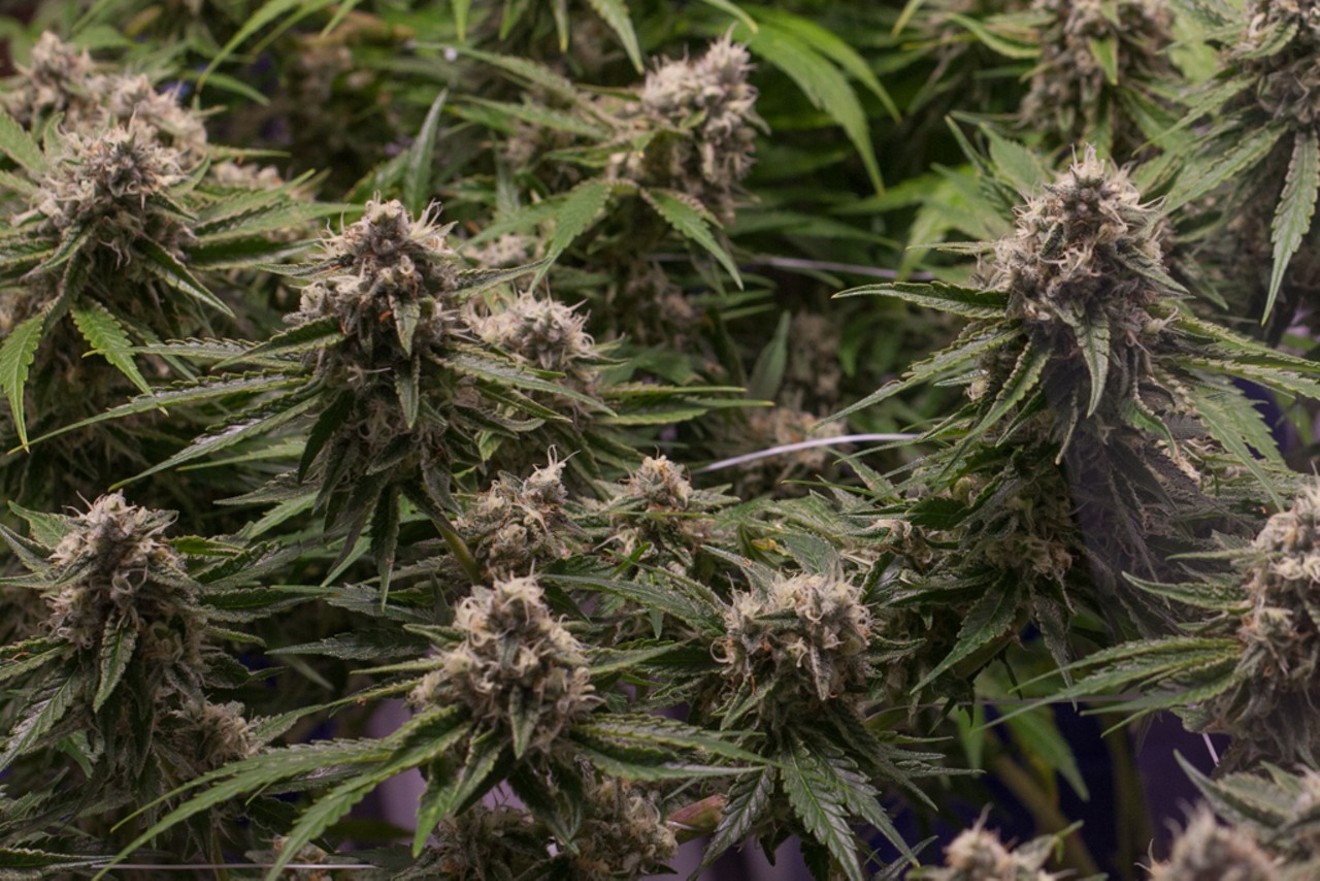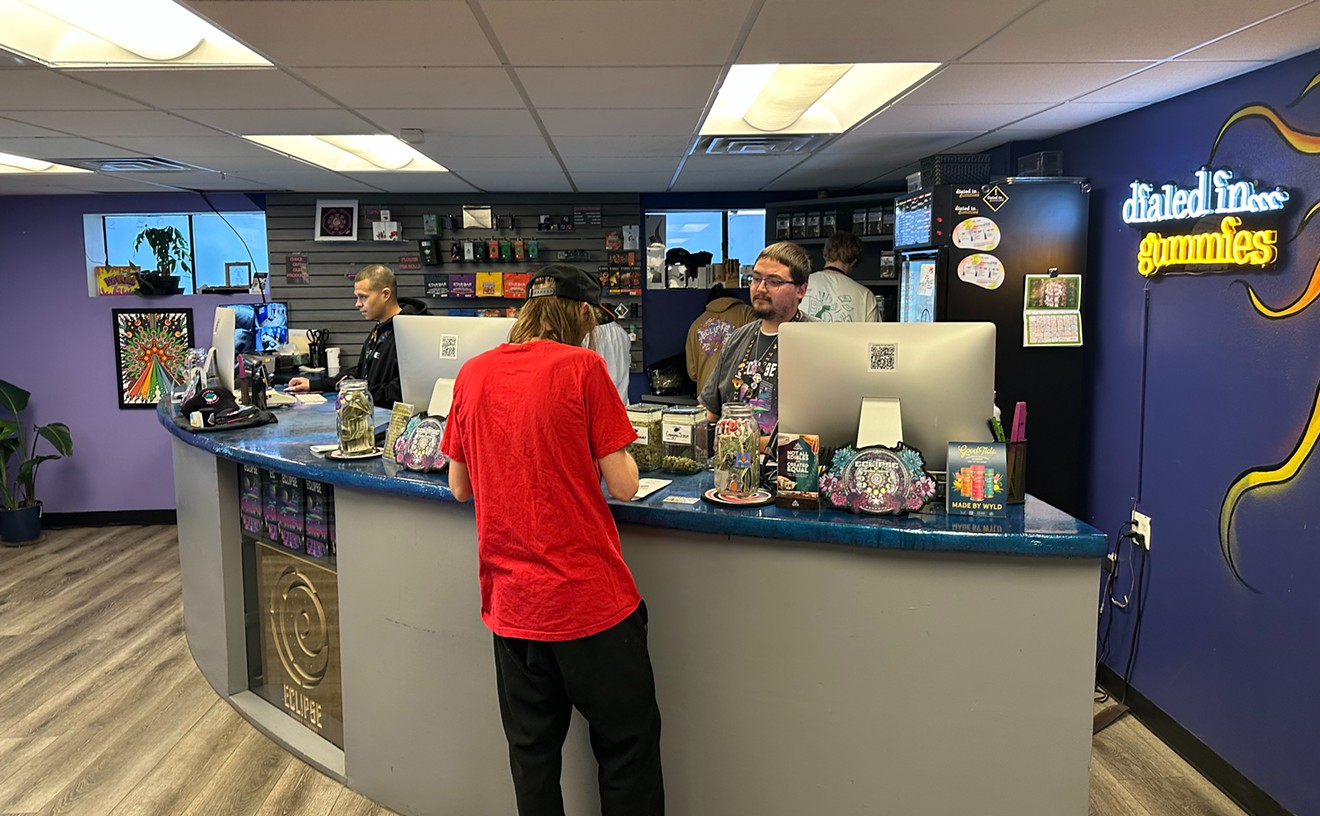This year, the Colorado Legislature further established this state as an epicenter of cannabis, passing laws that expanded medical marijuana access and legalized social use businesses, such as pot cafes and smoking lounges. The state also continued in its role as a guinea pig of regulation and cannabis culture, dealing with challenges ranging from moldy pot to equitable industry participation.
After trimming our way through the year's stories, we landed on these as the ten biggest in 2019:
Moldy Marijuana
Moldy cannabis wasn't on the radar of regulators at the dawn of retail legalization, but it's since surpassed pesticides as the leading cause of commercial pot recalls. Since December 2018, at least seven different health orders issued by city and state governments have recalled cannabis that failed microbial testing from dozens of dispensaries, including some of the state's largest chains. Not only are there worries about the level of mold and yeast inside grows, but there are also concerns about shady practices used to pass lab testing, as well as steps down the packaging and storage roads that could inadvertently lead to further contamination, as shown by a round of Denver Department of Public Health and Environment investigations that led to 20 out of 25 dispensaries failing mold and yeast testing. Some industry representatives say the testing is too harsh, while others consider these recalls a reckoning for a previously unregulated field of agriculture.
Consolidation Begins
In 2019, we began to see a turn toward consolidation and corporate involvement in Colorado's cannabis industry, something that had previously been prevented by state laws that blocked publicly traded companies from owning marijuana business licenses. Those rules ended in November, however, and the buying sprees have already started. Medicine Man Technologies, a public firm located in Denver that helped write the law allowing publicly traded participation, has agreed to purchase over thirty dispensaries, as well as several cultivations and infused-product brands. Meanwhile, the Green Solution, one of the state's largest dispensary brands, agreed to sell all of its twenty-plus dispensary and growing operations to a Canada-based public marijuana firm.
Proponents of the new rule say that more capital and public entity involvement were a natural progression for a legal trade, while others worry about small businesses getting shoved aside. Some Denver dispensary owners think the effects of outside money itself may be overestimated, though. "I'll bet some banker types look at Amy and I and think that if we can do it, then they'll kill us with all of their money and resources," L'Eagle owner John Andrle said in November. "But there's all sorts of examples of those models going out of business in two years."
Social Equity
As nationwide cannabis legalization becomes more of a "when" than an "if" scenario, energy and focus have shifted toward the human side of the plant. Activists fighting for nonviolent cannabis felons and victims of the War on Drugs have taken issue with a largely white-owned cannabis industry, and Colorado is ground zero for some of these discussions. Although this was the first state to legalize retail pot, Colorado has been criticized for its lack of social-equity programs, with minority business owners pushing for more training programs, access to capital and lower barriers to entry into the cannabis space for minority entrepreneurs, as well as easier paths to expungement for former cannabis offenders. Still, Denver and Boulder programs created to clear prior cannabis convictions struggled to find qualified applicants for record-sealing in 2019, with state laws preventing mass expungement efforts.
Meanwhile, elected officials in Denver and in Washington, D.C., are talking about how to promote social equity in legal cannabis. Steps were taken at the state level, with legislators creating new micro business licenses for budding entrepreneurs without financial resources, as well as eliminating a rule banning anyone from becoming a licensed marijuana employee if they were convicted of a felony within the past five years or of a drug felony within the past ten years. The new law removes the special drug-felon ban and cuts the five-year ban for felons to three years.
CBD Everything
Was 2019 the peak of CBD? Some of us sure hope so. With hemp's federal legalization the year before (even though that didn't legalize CBD federally, and the FDA still frowns on it despite very little enforcement), the non-intoxicating cannabinoid has finally gotten shine. And it certainly seems to deserve some praise, with CBD's reported efficacy in treating certain forms of inflammation, epilepsy, skin disorders and other ailments. But things are getting out of hand. At first the CBD-infused coffee, doughnuts and protein bars seemed cute — but do we really need CBD in our Carl's Jr. burger, toilet paper, tobacco chew and pillow covers?
Legal Pot Lounges and Cafes...Almost
Denver and the rest of Colorado have struggled to figure out social cannabis use since the plant was legalized in 2012, but this year we might finally have found our footing. In May, the Colorado Legislature passed a law allowing restaurants, hotels, music venues and other businesses to apply for social pot use permits and dispensaries to apply for a tasting-room license similar to that of a brewery — if their respective town or county decides to allow them, as local governments must still opt in to the program.
If your local jurisdiction does allow social consumption licenses, non-dispensary businesses could also apply for limited pot sales, while mobile marijuana lounges such as tour buses and limousines will also be licensed but cannot sell marijuana; temporary licenses for special events will be available, too. None of these entities could have an active liquor license and allow social pot use, however, and we've only heard of one Colorado town — Durango — that is preparing to officially take on the issue. Denver's much-aligned social use program remained unaffected by the new law, and it's unlikely to be revisited until months into 2020.

Illnesses related to vaping THC went from relatively unheard of to numbering in the thousands in 2019.
Kenzie Bruce
This year wasn't kind to vapers, with well over 2,000 recorded cases of pulmonary illnesses related to vaping reported, and at least four dozen of those ending in death. One of those deaths and a handful of hospital visits happened in Colorado, with both marijuana and nicotine products linked to cases here and around the country (no specific vaping product has been named in connection with the Colorado death). Although the vast majority of users who became sick from marijuana vaping products were using black-market cartridges with traces of harmful pesticides and additives, at least one death was reportedly connected to a legal product purchased from a dispensary in Oregon.
The reports prompted the Colorado Marijuana Enforcement Division to ban any marijuana vaping products with vitamin E acetate — a chemical linked to vaping illness by the Centers for Disease Control and Prevention — along with polyethylene glycol (PEG) and medium chain triglycerides (MCT oil), two other chemical vaping additives. Looks like vaping damages more than your dignity.
A Breath for Medical Marijuana?
Since recreational pot was introduced, interest in medical marijuana has diminished, with some towns only allowing recreational businesses within their borders. As a result, medical sales have leveled out, and new medical marijuana startups almost slowed to a halt. However, medical marijuana advocates were very successful at the State Capitol this year, pushing a number of new laws that expand access and patient rights.
Emboldened by the election of Governor Jared Polis, advocates pushed the legislature to add autism spectrum disorder and any condition for which opioids are prescribed to the state's list of medical marijuana conditions, and to pass a law permitting more health-care professionals — dentists, psychiatrists, registered nurse practitioners and so on — to be able to recommend medical marijuana, and to recommend it for terms shorter than the previous one-year minimum. Another new law allowing parents of child patients to purchase medication more easily on their child's behalf went into effect.
Will the new laws create a wave of new patients? Not likely, but it shows that at least some people haven't forgotten about them.
Illegal Growing Operations
Several local law enforcement agencies have complained about illegal growing operations increasing since marijuana was legalized, especially in southern areas such as Pueblo County and Las Animas County, which says it eradicated over forty illicit pot cultivations through the first nine months of 2019. But the illegal growing operations aren't just happening outdoors in rural areas. In May, the Department of Justice, Drug Enforcement Administration and several state district attorneys announced what was described as the largest collective marijuana bust in Colorado history, in which over 80,000 marijuana plants, 41 homes, 25 vehicles and more than $2.1 million were seized, largely in suburban communities in Adams, Arapahoe and Douglas counties.
Federal Movement
It's easy to forget what those slowpokes in D.C. are up to with cannabis reform — Colorado's been moving at its own pace for years — but a mix of new generations of lawmakers and "woke" older politicians realizing the power of the cannabis vote has ushered in the most open-minded era of progressive pot reform we've ever seen (and we're not counting support for hemp, which is moving even faster). The U.S. House of Representatives made history in September by approving a bill introduced by Colorado Congressman Ed Perlmutter that would protect banks serving state-legal pot businesses from federal persecution, while a House committee moved a bill forward in November that would legalize cannabis at the federal level.
But Perlmutter's bill now awaits a Senate hearing, and the prohibition-ending bill, the MORE Act, still needs a hearing before the full House. Meanwhile, cannabis-friendly lawmakers have begun to focus on social-equity provisions in potential legalization measures, which could lengthen the process. Still, cannabis has never been sexier in the country's capital, and it's expected to get plenty of attention in the 2020 election.
Are These Prices High?
The beginning of 2019 was pretty soft on dispensary shoppers, with low prices previously unseen on dispensary menus. Eighths (3.5 grams) of high-quality cannabis were available at respected dispensaries for $15 to $20, and live resin was being sold for as low as $20 per gram on the right days. Then those jars on the discount shelf started getting a little emptier, and rumors about supply shortages, mold recalls and new industry players began circling.
According to MED estimates, the average price per pound of cannabis flower shot up nearly $600 from October 2018 to the end of 2019, while trim and plant matter for extraction have also increased in price. Now those $15 and $20 eighths are again $25 and $35, and live resin is back on the list of concentrates reserved for the wealthy. As pot is increasingly traded as a commodity and the industry undergoes additional growing pains, expect prices to keep fluctuating.












